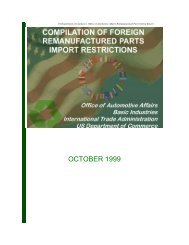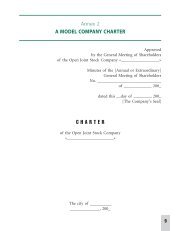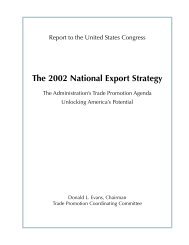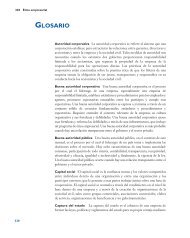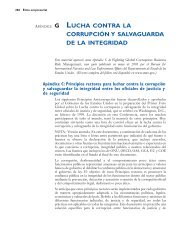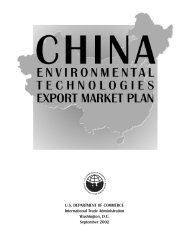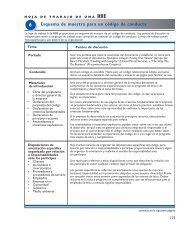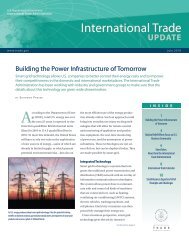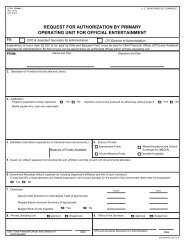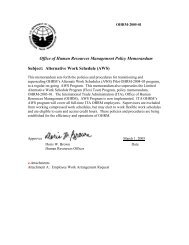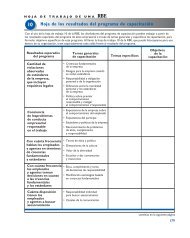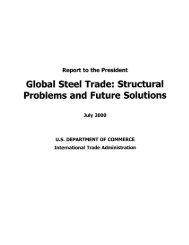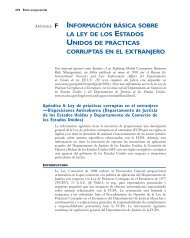Vietnam Environmental Technologies Export Market Plan
Vietnam Environmental Technologies Export Market Plan
Vietnam Environmental Technologies Export Market Plan
Create successful ePaper yourself
Turn your PDF publications into a flip-book with our unique Google optimized e-Paper software.
Case Study 6.2 Overseas Development<br />
Assistance is Driving the Business<br />
Viet Thang Textile Co., one of <strong>Vietnam</strong>’s largest textile<br />
companies, is listed in Ho Chi Minh City’s “black book” of<br />
leading polluters for good reason. Many of its plants dump<br />
untreated wastewater into canals used by local residents. In<br />
November 1999, the company took a large step toward getting<br />
off that list when it installed its first waste treatment plant with<br />
help from an unlikely source.<br />
Since 1992, Viet Thang had been doing business with Peja NV,<br />
a small Dutch trading company with a representative office in Ho<br />
Chi Minh City. Peja represented several European companies<br />
selling textile equipment to Viet Thang. Recognizing Viet Thang’s<br />
need for pollution control equipment, Peja suggested installing a<br />
waste treatment facility using another company it represented,<br />
Stork Aqua NV. Stork Aqua specializes in waste treatment<br />
facilities for the textile and dairy industries.<br />
Crucially, Peja and Stork were able to arrange financing so that<br />
Viet Thang only had to bear part of the plant’s cost. The firms<br />
applied for, and won, a grant from the Dutch development aid<br />
agency to fund 75 percent of the plant’s $2.5 million cost. Viet<br />
Thang financed the rest, using loans from local banks.<br />
Today the plant is one of the largest ever installed at a stateowned<br />
firm. The facility has a capacity of 5,000 cubic meters of<br />
wastewater per day. The plant reduces BOD to less than 20 mg/<br />
liter, COD to less than 50 mg/liter, and total suspended solids to<br />
less than 50 mg/liter.<br />
Since the plant opened, Peja has received numerous calls from<br />
other state-owned companies seeking to reduce their emissions<br />
and wastewater discharges. Peja has also been active in contacting<br />
state-owned firms listed in the Ho Chi Minh City and Hanoi<br />
environmental black books to propose similar financing schemes.<br />
(See Appendixes K, L, and M for lists of black book firms.)<br />
At the time of publication, numerous local and foreign<br />
suppliers of wastewater treatment equipment were<br />
preparing to bid on a project to supply the state-owned<br />
firm Vinamilk with a treatment plant. Vinamilk is often<br />
voted for <strong>Vietnam</strong>’s most successful local company, so<br />
it is possible that Vinamilk will be able to finance<br />
installation of the plant from its own resources.<br />
Hanoi Urban Infrastructure Project<br />
The Japan Bank for International Cooperation (JBIC,<br />
formerly OECF) has committed a loan of 11.4 billion yen<br />
toward the development of a new urban center in the<br />
Thang Long North Area, 20 kilometers north of Hanoi.<br />
Overcrowding in Hanoi’s city center is straining its<br />
infrastructure. Under a master plan of Hanoi Urban<br />
Development prepared by Japanese consultants, the new<br />
urban area will be comprised of an industrial zone, a<br />
residential area, a commercial area, and a cargo<br />
distribution center.<br />
Wastewater treatment plants, water supply systems,<br />
drainage and sewerage networks, power supply and a road<br />
system are major additions to be built to improve the<br />
existing infrastructure. The JBIC loan will go toward civil<br />
works, equipment, and consulting services to the project.<br />
HCMC <strong>Environmental</strong> Sanitation<br />
The World Bank–financed $180 million HCMC<br />
<strong>Environmental</strong> Sanitation project will contain a<br />
wastewater treatment component in the future. The bank<br />
has suggested that by 2010, Ho Chi Minh City should<br />
build a biotech treatment plant for the Nhieu Loc Thi<br />
Nghe basin with an initial capacity of 400,000 m 3 per<br />
day.<br />
A $142 million treatment station will eventually be<br />
built where the canal empties into the Saigon River, but<br />
funds are not currently available for its construction. For<br />
now, project developers are following the maxim “the<br />
solution to pollution is dilution” and plan to only build a<br />
pumping station at the end of the canal.<br />
Local <strong>Environmental</strong> Service Companies<br />
Because the key components used for wastewater<br />
treatment plants are almost exclusively imported, an<br />
active market exists for suppliers of pumps, motors,<br />
aerators, and filters. Some regular purchasers of these<br />
items are local environmental service companies. These<br />
firms are often small-scale treatment plants, offering<br />
primary wastewater treatment.<br />
Local companies import equipment, then assemble the<br />
machinery and install the plant onsite. These companies<br />
service both local- and foreign-invested enterprises. For<br />
example, the Center for <strong>Environmental</strong> Technology<br />
(ECO) in Ho Chi Minh City has installed waste treatment<br />
facilities for some of the largest foreign investors in<br />
<strong>Vietnam</strong>, such as Cargill, Morning Star Cement, and<br />
<strong>Vietnam</strong> Brewery.<br />
Another consistent importer of equipment for<br />
wastewater treatment systems in Ho Chi Minh City, is<br />
the Center for <strong>Environmental</strong> Technology and Management<br />
(CENTEMA). Like most other significant<br />
environmental organizations in <strong>Vietnam</strong>, CENTEMA<br />
doubles as a research institute and commercial enterprise.<br />
CENTEMA conducts environmental monitoring and<br />
provides engineering/consulting services. Its research has<br />
centered on pollution control at <strong>Vietnam</strong>’s largest<br />
industrial zones, primarily in the Ho Chi Minh City-Bien<br />
Hoa-Vung Tau industrial triangle. Some of its largest<br />
clients for wastewater treatment systems have included<br />
the ProSun textile factory, Thanh An Seafood Processing<br />
Co., and VEDAN Co., one of <strong>Vietnam</strong>’s largest food<br />
processing companies.<br />
30 U.S. Department of Commerce, International Trade Administration



